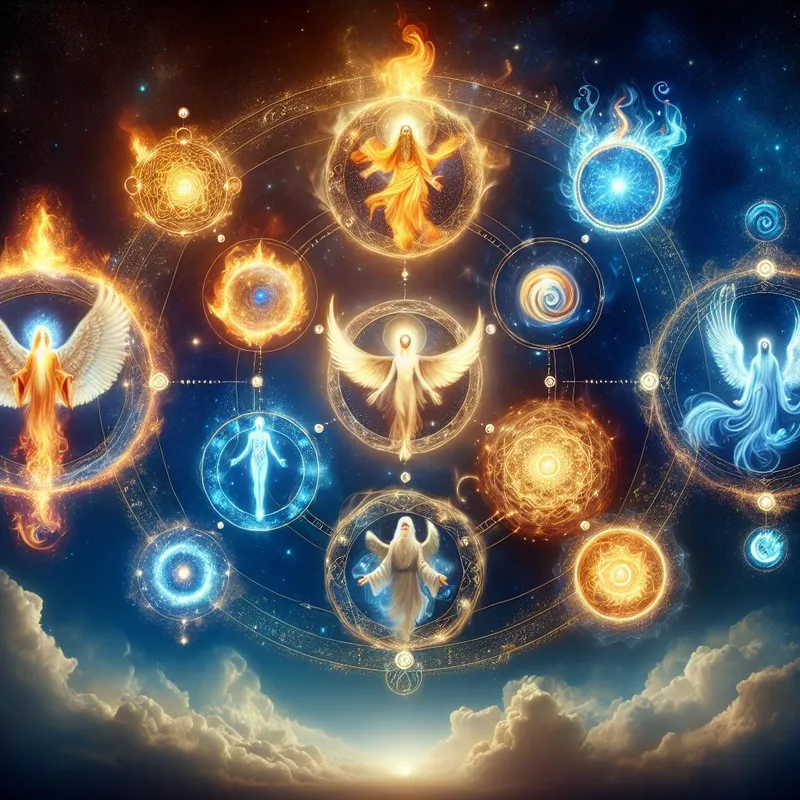
'Unveiling the Seven Spirits of God: Empowering Insights for Christian Believers'
Posted on 30 May 2024
The Seven Spirits of God: Understanding Their Meaning in the Book of Revelation
The book of Revelation mentions the "seven spirits of God" several times, but their identity and significance may not be immediately clear. In order to understand the meaning behind this phrase, we need to carefully examine the context and symbolism presented in the book. Let's explore this topic further.
The Mention of the Seven Spirits of God in Revelation
The book of Revelation refers to the seven spirits of God in several passages. In Revelation 1:4-5, John addresses the seven churches in Asia and speaks of grace and peace coming from "him who is, and who was, and who is to come," the seven spirits before God's throne, and Jesus Christ. In Revelation 3:1, Jesus is described as holding the seven spirits of God. Additionally, in Revelation 4:5, there is a depiction of seven lamps blazing before God's throne, symbolizing the seven spirits of God. Finally, in Revelation 5:6, the Lamb (referring to Jesus) is described as having seven eyes, which are identified as the seven spirits of God sent out into all the earth.
Identifying the Seven Spirits
While the passages do not explicitly state the identity of the seven spirits, we can arrive at a proper interpretation by examining other biblical references and considering the context. It is important to note that these spirits cannot be seven angelic beings like seraphim or cherubim because of the context provided in Revelation 1:4. John attributes grace and peace to three sources: "him who is, and who was, and who is to come," the seven spirits before God's throne, and Jesus Christ. This triadic structure suggests a depiction of the Trinity—grace and peace are given by the Father, Son, and Holy Spirit.
In Revelation 3:1, Jesus is mentioned as holding the seven spirits of God. This aligns with John 15:26, where Jesus states that He will send the Holy Spirit from the Father. These passages highlight the role of the Son as superior and the Spirit as subordinate.
Furthermore, Revelation 4:5 portrays the seven spirits of God as seven burning lamps before God's throne. This imagery resonates with Zechariah's vision (Zechariah 4:2) where the Holy Spirit is symbolized as a solid gold lampstand with seven lamps. This connection strengthens the interpretation that the "seven spirits" refer to the Holy Spirit.
In Revelation 5:6, the "seven spirits" are equated with the "seven eyes" of the Lamb (Jesus). These eyes represent the omniscience of the Holy Spirit and Jesus, while their being sent out into all the earth indicates their omnipresence.
The Significance of "Seven"
Once we identify the "seven spirits" as the Holy Spirit, we may wonder why there are specifically seven spirits mentioned. In biblical symbolism, the number seven often represents perfection and completion. Therefore, John's vision in Revelation includes a depiction of the perfect and complete Holy Spirit.
Isaiah 11:2 also provides a seven-fold description of the Holy Spirit: "The Spirit of the LORD will rest on him—the Spirit of wisdom and of understanding, the Spirit of counsel and of power, the Spirit of knowledge and of the fear of the LORD." This prophecy describes how the Messiah would be empowered by one Spirit, but with seven distinct attributes:
- The Spirit of the LORD
- The Spirit of wisdom
- The Spirit of understanding
- The Spirit of counsel
- The Spirit of power
- The Spirit of knowledge
- The Spirit of the fear of the Lord
This further supports the idea that the "seven spirits" in Revelation symbolize the Holy Spirit in the perfection of His manifold ministry.
Why This Matters
Understanding the meaning behind the "seven spirits of God" in Revelation helps us grasp the significance of the Holy Spirit's role in our lives. The Holy Spirit is not merely an impersonal force, but a divine Person within the Trinity. He plays a vital role in empowering and guiding believers, as depicted by the seven attributes mentioned in Isaiah 11:2.
Recognizing the perfection and completion associated with the number seven also highlights the completeness of the Holy Spirit's work. As believers, we can find comfort and assurance knowing that the Holy Spirit, in all His fullness, is at work in us and throughout the world.
Think About It
Consider how your understanding of the Holy Spirit might be deepened by recognizing His role as depicted in the "seven spirits of God." How does this knowledge impact your relationship with God and your reliance on the Holy Spirit's guidance?
As you meditate on the significance of the number seven, contemplate how it reflects God's perfection and completeness. How does this understanding enhance your appreciation for God's work in your life and in the world?
In conclusion, the "seven spirits of God" mentioned in the book of Revelation symbolize the Holy Spirit in His perfect and complete ministry. While specific identification is not explicitly provided, biblical context and symbolism support this interpretation. Understanding this symbolism enriches our understanding of the Holy Spirit's role in empowering and guiding believers. The number seven represents perfection and completion, emphasizing the completeness of the Holy Spirit's work. May this knowledge deepen our appreciation for God's presence and guidance through His Spirit.
